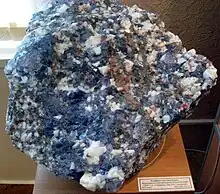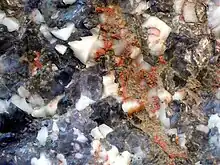
Sylvinite from Perm Krai, Russia

Close-up view of sylvinite from Perm, Russia
Sylvinite is a sedimentary rock made of a mechanical mixture of the minerals sylvite (KCl, or potassium chloride) and halite (NaCl, or sodium chloride).[1][2] Sylvinite is the most important source for the production of potash in North America, Russia and the UK.[2][3] Most Canadian operations mine sylvinite with proportions of approximately 31% KCl and 66% NaCl with the balance being insoluble clays, anhydrite and in some locations carnallite. Other deposits of sylvinite are located in Belarus, Brazil, France, Germany, Kazakhstan, Slovakia and Spain.[4]
References
- ↑ Wardlaw, Norman C. (1968). "Carnallite-Sylvite Relationships in the Middle Devonian Prairie Evaporite Formation, Saskatchewan". Geological Society of America Bulletin. 79 (10): 1273–1294. Bibcode:1968GSAB...79.1273W. doi:10.1130/0016-7606(1968)79[1273:CRITMD]2.0.CO;2.
- 1 2 Weiss N.L., SME Mineral Processing Handbook 1985, Page 22-2
- ↑ "Potash". Mineral Planning Factsheet. British Geological Survey. 2011. Retrieved 8 February 2017.
- ↑ "Sylvinite". mindat.org. 29 December 2016. Retrieved 8 February 2017.
This article is issued from Wikipedia. The text is licensed under Creative Commons - Attribution - Sharealike. Additional terms may apply for the media files.